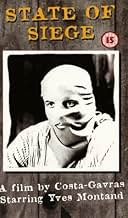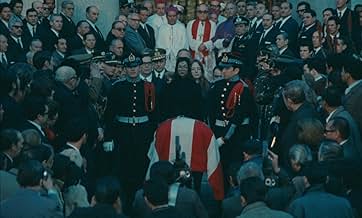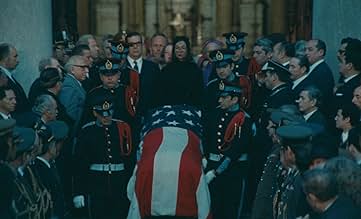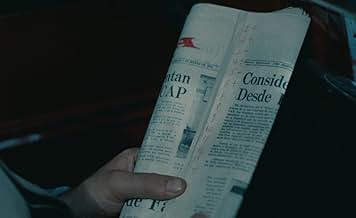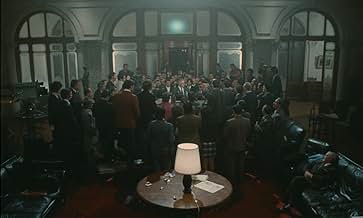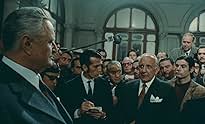État de siège
- 1972
- Tous publics
- 2h 10min
Avec pour toile de fond l'interrogation d'un expert américain de la contre-insurection, le film explore la lutte entre le gouvernement uruguayen et les guérillas Tupamaro gauchistes.Avec pour toile de fond l'interrogation d'un expert américain de la contre-insurection, le film explore la lutte entre le gouvernement uruguayen et les guérillas Tupamaro gauchistes.Avec pour toile de fond l'interrogation d'un expert américain de la contre-insurection, le film explore la lutte entre le gouvernement uruguayen et les guérillas Tupamaro gauchistes.
- Victoire aux 1 BAFTA Award
- 2 victoires et 5 nominations au total
Histoire
Le saviez-vous
- AnecdotesThis was going to be the first movie shown in the new John F. Kennedy Center for the Performing Arts in Washington, D.C. It was cancelled because the plot of the movie was judged to be inappropriate. This caused a big controversy. A Washington D.C. television station took advantage of the controversy by acquiring the broadcast rights to the film and showing it uncut after running a big advertising campaign calling it the "film banned from the Kennedy Center."
- GaffesThe International Police Academy meeting, in the flashback, takes place in 1967. But mention is made that "Technological advances have put man on the moon," which would not occur until 1969.
- Citations
Woman Senator: The frequent use of torture's intruments has been proved by the investigating comission. Remember, that this comission is composed by members of all parties present in the parliament. Your conclusions, voted by uninamity, are those. First: it has been proved that torture has become a frequent and habitual system in our country. Second: those tortures are practiced against people who even being innocent, are not submitted to a legal questioning, and against people who, submitted to a legal questioning, would have been declared innocent. Third: the main victims of those methods are the students and the union leaders. Fourth: the explanations from competent authorities, which deny the existence of those methods or declare not even knowing about them, are unacceptable, because to accept them it would mean to admit the existence of paralel organizations, autonomous and uncontrolable inside our police system. That's it, Mr. President. Gentlemen, this is what's happening in our country. All of that occurs daily in our country. All of that must end in our country. Government lords, I don't know if you were aware or not about all that. Anyway, however, you no longer have the right to govern our country.
- ConnexionsFeatured in La solitude du chanteur de fond (1974)
- Bandes originalesFantasia in G minor, BWV 542 ('Great')
(uncredited)
Written by Johann Sebastian Bach
Played by the organ at the end of the funeral near the end of the movie.
Costa-Gavros managed to produce a stinging indictment of US involvement in South American politics, without drawing his villains as caricatures. His characters, policemen and revolutionaries, come off as profoundly human, flawed but not themselves monsters, though they are involved in monstrous acts. The torture scenes are grueling, and were probably as responsible for the film's official reception.
I saw this at the age of 15, when it was in the theaters. I confused it with the Eric Ambler novel of the same name. It had a profound personal influence on me. I was able to rent it once, about 15 years ago but haven't run across it since.
Meilleurs choix
- How long is State of Siege?Alimenté par Alexa
Détails
- Date de sortie
- Pays d’origine
- Langues
- Aussi connu sous le nom de
- State of Siege
- Lieux de tournage
- Sociétés de production
- Voir plus de crédits d'entreprise sur IMDbPro
Box-office
- Montant brut aux États-Unis et au Canada
- 1 127 482 $US
Contribuer à cette page


![Regarder Bande-annonce [OV]](https://m.media-amazon.com/images/M/MV5BNTlmZTlhYjktNThkYy00NDAyLTlkNjUtNDIwMTU3MmVhYTgyXkEyXkFqcGdeQXRyYW5zY29kZS13b3JrZmxvdw@@._V1_QL75_UX500_CR0)


